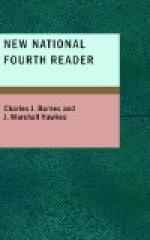When the emperor entered the room, the widow and her children looked at him in astonishment. They did not know he was their emperor.
“I am a physician, madam,” said he, bowing respectfully; “your neighbors have informed me of your illness, and I am come to offer what service may be in my power.”
“Alas! sir,” she answered with some hesitation, “I have no means of paying you for your attention.”
“Do not distress yourself on that account; I shall be fully repaid if I have the happiness of restoring you to health.”
With these words, the emperor approached the bed and inquired all about her illness, after which he wrote a few lines and placed them on the chimney-piece.
“I will leave you this prescription, madam; and on my next visit, I hope to find you much better.” He then withdrew. Almost immediately after this, the eldest son of the widow came in with a medical man.
“O mother!” cried the boy, “a kind, good gentleman has given me all this!” and he placed in his mother’s hand, the money which the emperor had given him. “There now, don’t cry, mother; this money will pay the doctor and buy every thing till you are well and strong again.”
“A physician has already been here, my child, and has left his prescription. See, there it is.” and she pointed to the paper on the chimney-piece. The boy took the paper, and no sooner had he glanced at its contents, than he uttered an exclamation of joyful surprise.
“O mother! It’s the best prescription a physician ever wrote; it’s an order for a pension, mother—a pension for you—signed by the emperor himself; listen, mother; hear what he says:—
“’Madam:—Your son was fortunate enough to meet me in the city, and informed me of the fact that the widow of one of my bravest officers was suffering from poverty and sickness, without any means of assistance. I had no knowledge of this, therefore I can not be accused of injustice.
“’It is difficult for me to know every thing that takes place in my empire. Now that I do know of your distress, I should indeed be ungrateful, did I not render you all the help in my power. I shall immediately place your name on the pension list for the yearly sum of two thousand florins, and trust that you may live many years to enjoy it.
“‘Joseph II.’”
The widow and her children were taken under the especial care of the emperor, and a brilliant career was opened up for the boys, who had inherited all their father’s bravery as well as their mother’s gentle nature.
* * * * *
Directions for Reading.—Mark the inflection of the following questions.
Where do you live?
Is your name Harry or John?
Why are you begging?
Do you wish to walk?
In such a question as the last one, if emphasis be given in turn to the words you, wish, walk, the answer might still be yes or no; and yet the meaning of the answer would be different in each case.




